-
 Bitcoin
Bitcoin $86,989.5773
2.47% -
 Ethereum
Ethereum $1,907.7486
-0.28% -
 Tether USDt
Tether USDt $0.9998
0.00% -
 XRP
XRP $2.1782
1.30% -
 BNB
BNB $605.9725
-1.07% -
 Solana
Solana $130.9318
2.03% -
 USDC
USDC $0.9997
-0.03% -
 Dogecoin
Dogecoin $0.1757
1.47% -
 Cardano
Cardano $0.6948
1.08% -
 TRON
TRON $0.2378
0.79% -
 Toncoin
Toncoin $4.0441
0.19% -
 Chainlink
Chainlink $14.1226
-0.93% -
 UNUS SED LEO
UNUS SED LEO $9.3952
0.65% -
 Stellar
Stellar $0.2737
-1.37% -
 Avalanche
Avalanche $19.7700
-0.01% -
 Sui
Sui $2.4853
0.25% -
 Shiba Inu
Shiba Inu $0.0...01283
-0.56% -
 Hedera
Hedera $0.1728
-0.67% -
 Polkadot
Polkadot $4.2112
-0.14% -
 Litecoin
Litecoin $86.0983
1.27% -
 Bitcoin Cash
Bitcoin Cash $312.1520
-0.42% -
 MANTRA
MANTRA $6.3442
0.01% -
 Bitget Token
Bitget Token $4.6044
-0.33% -
 Dai
Dai $0.9999
0.00% -
 Ethena USDe
Ethena USDe $0.9999
0.00% -
 Hyperliquid
Hyperliquid $14.0809
4.33% -
 Pi
Pi $0.6847
-3.43% -
 Monero
Monero $219.9574
0.86% -
 Uniswap
Uniswap $6.2581
0.04% -
 Pepe
Pepe $0.0...07858
1.61%
Which is better, Bitcoin ETF or direct purchase of Bitcoin?
Bitcoin ETFs offer regulated, accessible exposure to Bitcoin's price, while direct purchase provides ownership but necessitates managing security and regulatory complexities; the best choice depends on individual risk tolerance and investment goals.
Feb 27, 2025 at 12:54 am

Which is Better: Bitcoin ETF or Direct Purchase of Bitcoin?
Key Points:
- Understanding Bitcoin ETFs: Bitcoin ETFs (Exchange-Traded Funds) offer indirect exposure to Bitcoin's price movements through a regulated investment vehicle. They are traded on established stock exchanges, offering ease of access and regulatory oversight. However, they don't provide direct ownership of Bitcoin.
- Direct Bitcoin Purchase: Buying Bitcoin directly involves acquiring and holding the cryptocurrency itself, usually through a cryptocurrency exchange or wallet. This grants complete ownership and control over the asset, but introduces complexities related to security, storage, and regulatory uncertainty depending on your jurisdiction.
- Comparative Analysis: The "better" option depends heavily on individual investor profiles, risk tolerance, and investment goals. Factors like investment experience, security concerns, regulatory comfort levels, and trading fees all play a significant role in determining the optimal approach.
I. Understanding Bitcoin ETFs:
- Bitcoin ETFs are investment funds that track the price of Bitcoin. They are traded on major stock exchanges like the New York Stock Exchange (NYSE) or Nasdaq, making them accessible to a broader range of investors than direct Bitcoin purchases. The ETF manager invests in Bitcoin (or Bitcoin-related derivatives) and issues shares representing a proportional stake in the underlying assets. This means investors don't directly own Bitcoin, but they benefit from its price appreciation (or suffer from depreciation). The price of the ETF shares will generally mirror the price of Bitcoin, albeit with minor discrepancies due to management fees and other expenses.
- The regulatory framework surrounding Bitcoin ETFs is a crucial aspect. Many jurisdictions have stringent rules governing the listing and trading of ETFs, particularly those linked to cryptocurrencies. This regulatory oversight aims to protect investors from fraud and market manipulation. The approval process for Bitcoin ETFs can be lengthy and complex, involving rigorous due diligence by regulatory bodies. This process ensures the ETF adheres to specific standards and safeguards investor interests. However, the regulatory environment for cryptocurrencies is constantly evolving, and the rules governing Bitcoin ETFs might vary significantly across different jurisdictions. Therefore, investors should be aware of the specific regulations in their country before investing in a Bitcoin ETF.
- Investing in a Bitcoin ETF offers several advantages. First, it provides a level of regulatory compliance and transparency that direct Bitcoin ownership might lack. Second, ETFs are typically traded through established brokerage accounts, simplifying the investment process for those unfamiliar with cryptocurrency exchanges. Third, ETFs are generally considered less risky than direct Bitcoin ownership in terms of security concerns, as they are managed by established financial institutions with robust security measures. Finally, ETFs offer a more familiar and comfortable investment vehicle for many traditional investors who might be hesitant to navigate the complexities of the cryptocurrency market directly. The accessibility and ease of trading are key selling points for Bitcoin ETFs.
II. Direct Purchase of Bitcoin:
- Purchasing Bitcoin directly involves acquiring and holding the cryptocurrency itself. This typically involves creating an account on a cryptocurrency exchange, verifying your identity, and then buying Bitcoin using fiat currency (like USD, EUR, or GBP) or other cryptocurrencies. Once purchased, the Bitcoin is held in a digital wallet, which can be either a software wallet (installed on a computer or mobile device) or a hardware wallet (a physical device specifically designed for secure cryptocurrency storage). This method grants the investor complete control over their Bitcoin. They have direct ownership of the asset and can transfer it freely, subject to the rules and regulations of the relevant blockchain network.
- Direct ownership of Bitcoin presents a unique set of challenges and risks. Security is paramount. Cryptocurrency exchanges and wallets have been targets of hacking and theft, resulting in significant financial losses for investors. Protecting your private keys (the passwords that allow access to your Bitcoin) is crucial. Losing your private keys effectively means losing your Bitcoin, as there's no central authority to recover them. This necessitates a high level of technical understanding and caution to avoid security breaches. Additionally, the volatile nature of Bitcoin requires a strong risk tolerance. The price of Bitcoin can fluctuate dramatically in short periods, leading to substantial gains or losses.
- The regulatory landscape surrounding direct Bitcoin ownership is also a key consideration. Many jurisdictions have varying regulatory frameworks for cryptocurrencies, and the legal status of Bitcoin can be uncertain. This uncertainty can impact taxation, compliance, and legal recourse in case of disputes. Investors should understand the relevant laws and regulations in their jurisdiction before purchasing and holding Bitcoin directly. Furthermore, the technical complexities involved in managing a cryptocurrency wallet and interacting with the blockchain network can be daunting for some investors. Understanding transaction fees, blockchain technology, and the various types of wallets is essential for managing Bitcoin effectively.
III. Comparative Analysis: ETFs vs. Direct Purchase
- Regulatory Compliance and Oversight: Bitcoin ETFs operate within a regulated framework, providing a level of investor protection not always present in direct Bitcoin purchases. Direct ownership exposes investors to greater regulatory uncertainty depending on their jurisdiction.
- Ease of Access and Trading: Bitcoin ETFs are easily traded through established brokerage accounts, offering convenience and familiarity for traditional investors. Direct Bitcoin purchases require using cryptocurrency exchanges, which can be more complex and less user-friendly for those new to the crypto space.
- Security and Risk: Bitcoin ETFs generally offer greater security due to the management by established financial institutions. Direct ownership exposes investors to the risk of hacking, loss of private keys, and other security breaches.
- Ownership and Control: Direct Bitcoin purchase grants complete ownership and control over the asset, allowing for greater flexibility and potential upside. Bitcoin ETFs offer indirect exposure, limiting control and potentially reducing profit potential due to fees.
- Fees and Expenses: Both options involve fees, but the types and amounts differ. ETFs have management fees, while direct purchases involve transaction fees on exchanges and potentially storage fees for hardware wallets.
- Tax Implications: The tax implications of Bitcoin ETFs and direct purchases can vary significantly depending on jurisdiction and individual circumstances. Understanding these implications is crucial for both investment strategies.
FAQs:
Q: Are Bitcoin ETFs safer than directly buying Bitcoin?
A: Bitcoin ETFs generally offer more regulatory oversight and are managed by established financial institutions with robust security measures, making them potentially safer than directly holding Bitcoin, which exposes you to the risks of hacking, loss of private keys, and exchange failures. However, no investment is entirely risk-free.
Q: Which option is better for long-term investors?
A: Both options can be suitable for long-term investors. Bitcoin ETFs offer a simpler, more regulated approach, while direct purchases provide complete control and potential for higher returns, but with increased risk. The best choice depends on individual risk tolerance and investment goals.
Q: What are the tax implications of each option?
A: Tax implications vary widely by jurisdiction. Capital gains taxes will apply to profits from both ETFs and direct Bitcoin holdings. Consult a tax professional to understand the specific tax implications in your region. Regulations surrounding cryptocurrency taxation are still evolving in many countries.
Q: What are the fees associated with each option?
A: Bitcoin ETFs have management fees, typically around 0.5% annually. Direct purchases incur transaction fees on exchanges (which can vary significantly) and potentially storage fees for hardware wallets.
Q: Which option is more suitable for beginners?
A: Bitcoin ETFs are generally considered more suitable for beginners due to their ease of access and regulatory oversight. Directly buying Bitcoin requires a greater understanding of cryptocurrency exchanges, wallets, and security best practices.
Q: Can I buy fractional shares of Bitcoin through an ETF?
A: Yes, Bitcoin ETFs allow investors to buy fractional shares, making them accessible even with limited capital. Directly buying Bitcoin typically requires purchasing a whole unit, although some exchanges may allow for smaller amounts.
Q: What are the potential downsides of Bitcoin ETFs?
A: Potential downsides include lower potential returns compared to directly holding Bitcoin due to management fees and the inability to control the asset directly. Performance might also slightly lag behind the actual Bitcoin price.
Q: What are the potential downsides of directly buying Bitcoin?
A: Potential downsides include the significant risks associated with self-custody, including security breaches, loss of private keys, and the complexity of managing a cryptocurrency wallet. The volatile price of Bitcoin also represents a considerable risk.
Disclaimer:info@kdj.com
The information provided is not trading advice. kdj.com does not assume any responsibility for any investments made based on the information provided in this article. Cryptocurrencies are highly volatile and it is highly recommended that you invest with caution after thorough research!
If you believe that the content used on this website infringes your copyright, please contact us immediately (info@kdj.com) and we will delete it promptly.
- Binance co-founder Changpeng Zhao (CZ) believes 99.95% of AI agents do not need an ecosystem token.
- 2025-04-03 00:55:12
- Bitcoin Regains Bullish Momentum, Surging Past $87,000
- 2025-04-03 00:55:12
- Evolving From Speculative Investments to Mainstream Assets, WisdomTree Is at the Forefront of Leading the Charge
- 2025-04-03 00:50:12
- title: Tron founder Justin Sun has publicly declared that First Digital Trust, a Hong Kong-based fiduciary
- 2025-04-03 00:50:12
- Sentient Releases Open-Source AI Search Framework That Outperforms GPT-4o
- 2025-04-03 00:45:13
- This new Canadian coin offers a 360-degree view of the northern lights.
- 2025-04-03 00:45:13
Related knowledge
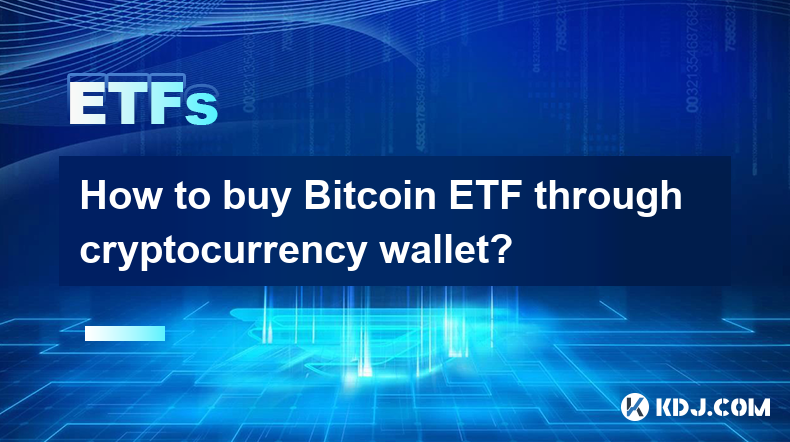
How to buy Bitcoin ETF through cryptocurrency wallet?
Mar 30,2025 at 08:22pm
It's important to understand that you cannot directly buy a Bitcoin ETF through a cryptocurrency wallet. Cryptocurrency wallets are designed to hold and manage digital assets like Bitcoin itself, not exchange-traded funds (ETFs). Bitcoin ETFs are traded on traditional stock exchanges, not decentralized cryptocurrency exchanges. Therefore, the process i...
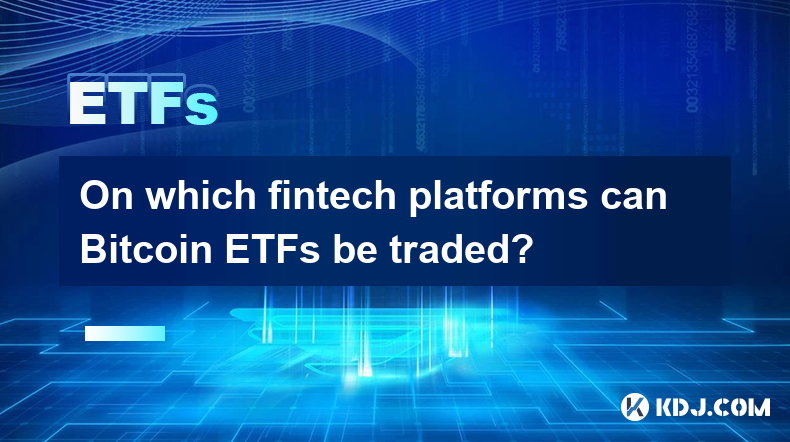
On which fintech platforms can Bitcoin ETFs be traded?
Mar 28,2025 at 09:21am
Navigating the Bitcoin ETF Landscape on Fintech PlatformsThe availability of Bitcoin ETFs on fintech platforms is a rapidly evolving landscape. Currently, the approval and subsequent listing of Bitcoin ETFs are subject to regulatory hurdles and vary significantly by jurisdiction. Therefore, the specific platforms offering Bitcoin ETF trading depend hea...
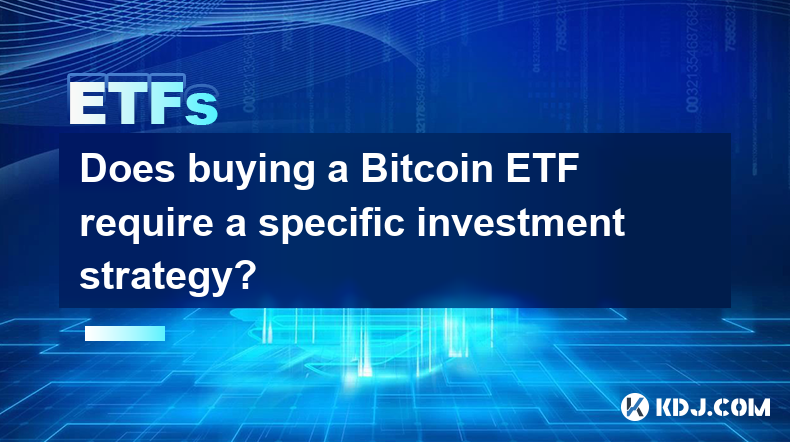
Does buying a Bitcoin ETF require a specific investment strategy?
Mar 27,2025 at 06:36pm
Understanding Bitcoin ETFs and Investment StrategiesA Bitcoin Exchange-Traded Fund (ETF) is a type of investment fund that tracks the price of Bitcoin. Investing in a Bitcoin ETF offers exposure to the cryptocurrency market without the complexities of directly owning and securing Bitcoin. However, like any investment, a successful strategy requires car...
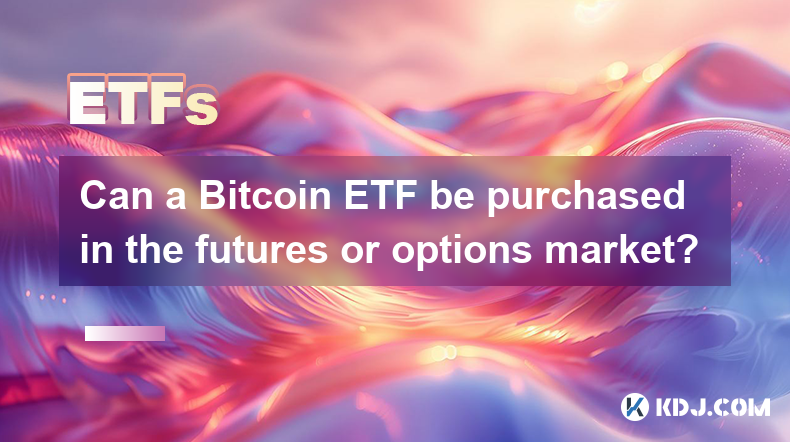
Can a Bitcoin ETF be purchased in the futures or options market?
Mar 27,2025 at 02:49am
Understanding Bitcoin ETFs and Derivative MarketsA Bitcoin ETF (Exchange-Traded Fund) is a fund that tracks the price of Bitcoin. Unlike directly buying Bitcoin, an ETF offers a more regulated and accessible way for investors to gain exposure to the cryptocurrency market through traditional brokerage accounts. However, the availability of a Bitcoin ETF...
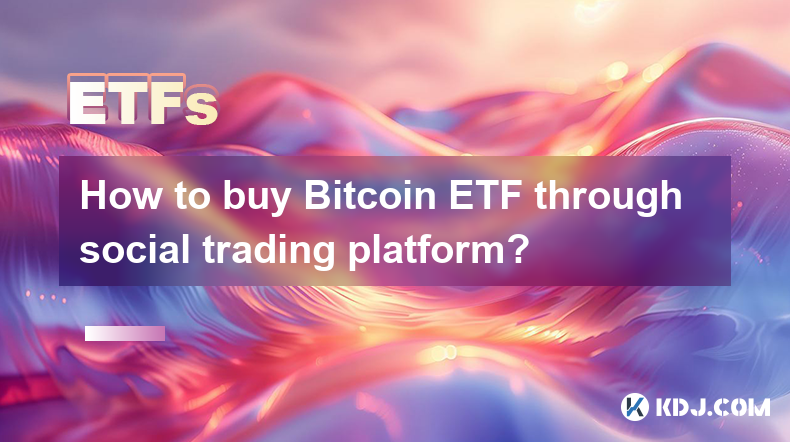
How to buy Bitcoin ETF through social trading platform?
Mar 27,2025 at 10:43am
How to Buy Bitcoin ETF Through Social Trading Platforms? Understanding Bitcoin ETFs and Social TradingA Bitcoin ETF (Exchange-Traded Fund) is a fund that tracks the price of Bitcoin. Unlike directly buying Bitcoin, an ETF offers a regulated and potentially less volatile way to gain exposure to the cryptocurrency market. This is because ETFs are traded o...
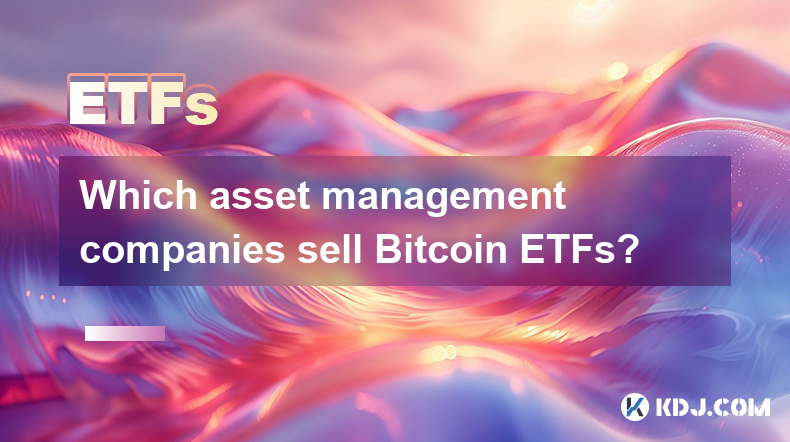
Which asset management companies sell Bitcoin ETFs?
Mar 28,2025 at 02:21am
The Current Landscape of Bitcoin ETF OfferingsCurrently, no asset management company offers a fully-fledged, SEC-approved Bitcoin ETF in the United States. While several companies have filed applications, the Securities and Exchange Commission (SEC) has yet to approve any. This is primarily due to concerns surrounding market manipulation, investor prot...

How to buy Bitcoin ETF through cryptocurrency wallet?
Mar 30,2025 at 08:22pm
It's important to understand that you cannot directly buy a Bitcoin ETF through a cryptocurrency wallet. Cryptocurrency wallets are designed to hold and manage digital assets like Bitcoin itself, not exchange-traded funds (ETFs). Bitcoin ETFs are traded on traditional stock exchanges, not decentralized cryptocurrency exchanges. Therefore, the process i...

On which fintech platforms can Bitcoin ETFs be traded?
Mar 28,2025 at 09:21am
Navigating the Bitcoin ETF Landscape on Fintech PlatformsThe availability of Bitcoin ETFs on fintech platforms is a rapidly evolving landscape. Currently, the approval and subsequent listing of Bitcoin ETFs are subject to regulatory hurdles and vary significantly by jurisdiction. Therefore, the specific platforms offering Bitcoin ETF trading depend hea...

Does buying a Bitcoin ETF require a specific investment strategy?
Mar 27,2025 at 06:36pm
Understanding Bitcoin ETFs and Investment StrategiesA Bitcoin Exchange-Traded Fund (ETF) is a type of investment fund that tracks the price of Bitcoin. Investing in a Bitcoin ETF offers exposure to the cryptocurrency market without the complexities of directly owning and securing Bitcoin. However, like any investment, a successful strategy requires car...

Can a Bitcoin ETF be purchased in the futures or options market?
Mar 27,2025 at 02:49am
Understanding Bitcoin ETFs and Derivative MarketsA Bitcoin ETF (Exchange-Traded Fund) is a fund that tracks the price of Bitcoin. Unlike directly buying Bitcoin, an ETF offers a more regulated and accessible way for investors to gain exposure to the cryptocurrency market through traditional brokerage accounts. However, the availability of a Bitcoin ETF...

How to buy Bitcoin ETF through social trading platform?
Mar 27,2025 at 10:43am
How to Buy Bitcoin ETF Through Social Trading Platforms? Understanding Bitcoin ETFs and Social TradingA Bitcoin ETF (Exchange-Traded Fund) is a fund that tracks the price of Bitcoin. Unlike directly buying Bitcoin, an ETF offers a regulated and potentially less volatile way to gain exposure to the cryptocurrency market. This is because ETFs are traded o...

Which asset management companies sell Bitcoin ETFs?
Mar 28,2025 at 02:21am
The Current Landscape of Bitcoin ETF OfferingsCurrently, no asset management company offers a fully-fledged, SEC-approved Bitcoin ETF in the United States. While several companies have filed applications, the Securities and Exchange Commission (SEC) has yet to approve any. This is primarily due to concerns surrounding market manipulation, investor prot...
See all articles























































































